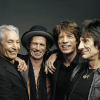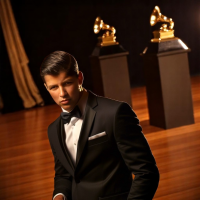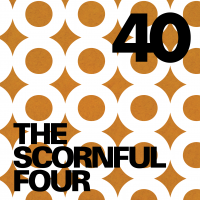Home » Jazz Musicians » Rod Stewart
Rod Stewart
Roderick David Stewart, born 10 January 1945, Highgate, London, England. The leading UK rock star of the 70s started his career as an apprentice professional with Brentford Football Club (over the years Stewart has made it known that football is his second love). Following a spell roaming Europe with folk artist Wizz Jones in the early 60s he returned to join Jimmy Powell And The Five Dimensions in 1963. This frantic R&B band featured Rod playing furious harmonica, reminiscent of James Cotton and Little Walter. As word got out, he was attracted to London and was hired by Long John Baldry in his band the Hoochie Coochie Men (formerly Cyril Davies' All Stars).
Without significant success outside the club scene, the band disintegrated and evolved into the Steampacket, with Baldry, Stewart, Brian Auger, Julie Driscoll, Mickey Waller and Rick Brown. Following a television documentary on the swinging mod scene, featuring Stewart, he collected his moniker 'Rod the Mod'. In 1965, he joined the blues-based Shotgun Express as joint lead vocalist with Beryl Marsden. The impressive line-up included Peter Green, Mick Fleetwood and Peter Bardens. By the following year, Stewart was well-known in R&B and blues circles, but it was joining the Jeff Beck Group that gave him national exposure. During his tenure with Beck he recorded two important albums, Truth and Cosa Nostra-Beck Ola and made a number of gruelling tours of America.
When the group broke up (partly through exhaustion) Stewart and Ron Wood joined the Faces, now having lost their smallest face, Steve Marriott. Simultaneously, Stewart had been signed as a solo artist to Phonogram, and he managed to juggle both careers expertly over the next six years. Though critically well-received, his first album sold only moderately; it was Gasoline Alley that made the breakthrough. In addition to the superb title track it contained the glorious 'Lady Day'. This album marked the beginning of the 'mandolin' sound supplied by the talented guitarist Martin Quittenton. Stewart became a superstar on the strength of his next two albums, Every Picture Tells A Story and Never A Dull Moment.
Taken as one body of work, they represent Stewart at his best. His choice and exemplary execution of non-originals gave him numerous hits from these albums including; 'Reason To Believe' ( Tim Hardin ), 'I'm Losing You' ( Temptations ), 'Angel' ( Jimi Hendrix ). His own classics were the irresistible chart- topping magnum opus 'Maggie May' and the wonderful 'You Wear It Well', all sung in his now familiar frail, hoarse voice. In the mid-70s, following the release of the below average Smiler, Stewart embarked on a relationship with the actress, Britt Ekland. Besotted with her, he allowed her to dictate his sense of dress, and for a while appeared in faintly ludicrous dungarees made out of silk and ridiculous jump suits.
Read moreTags
Faces: Early Steps
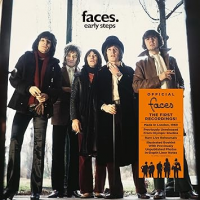
by Doug Collette
Released somewhat under the radar in the fall of 2025, Early Steps is the missing link in the chain of archiving projects within the vault of the now-defunct British band Faces. Its content discovered by late band member Ian McLagan while researching the essential box set Five Guys Walk Into A Bar (Rhino, 2004), this compendium joins the anthology Stay With Me (Rhino, 2012), the collection of full-length albums (plus a disc of outtakes, rarities, ...
Continue ReadingRonnie Wood: Fearless: The Anthology 1965-2025
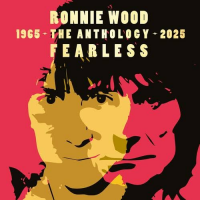
by Doug Collette
If the Ronnie Wood anthology Fearless proves anything, it is that the predominant virtues of the peripatetic British musician are largely intangible. Not that the guitarist, songwriter and singer is not talented in those various roles, but that his most salient attributes, at least as depicted here, as those of a convivial individual who invariably contributes to a nurturing atmosphere in a musical setting. Above all, the man known as 'Woody' serves the songs as well as his ...
Continue ReadingHot Rod Jazz God, Part 2: An Open Letter to Rod Stewart

by Jason West
Um, Mr. Stewart, if you're reading this, first I want to apologize. In the past I wrote some things that you may have found slightly offensive.Like those bits about harmless Uncle Rod who shows up on holidays with a bottle-shaped microphone and comparing your interpretation of standard jazz melodies to a bull in downtown Pamplona. Sorry, mate. I take it back. I admit I was bitter.Bitter because I'm a jazz musician. And like most jazz musicians, ...
Continue ReadingRod Stewart: Hot Rod, Jazz God

by Jason West
That smirk. That roguish, self-satisfied, da-ya-think-I'm-sexy smirk. It's back and getting bigger everywhere you look. On Leno. On Letterman. In fashion magazines. Holiday TV specials. What's next--a Super Bowl halftime smirkfest?2000 should have been the end of The Smirk. His rock star career, which started in swingin' London during the late 1960s and peaked artistically in 1971 with Every Picture Tells A Story, skyrocketed with the disco craze. Eighties hip-pumping video hits strengthened The Smirk's sex-symbol status, before ...
Continue ReadingRod Stewart and Stevie Nicks: North American Tour

Source:
JamBase
TICKETS GO ON SALE FRIDAY JANUARY 21 Rod Stewart and Stevie Nicks announced on The Ellen DeGeneres Show yesterday that they have joined forces for “The Heart & Soul Tour." Launching March 20, 2011 in Fort Lauderdale, Florida, the tour will unite the two for a series of arena concerts throughout North America—with performances already confirmed in New York, Toronto, Los Angeles, Philadelphia, Chicago, Detroit, Tampa, Montreal and more. The tour will feature both artists performing all rock & roll ...
read more
Rod Stewart: Vegas Residency

Source:
JamBase
CLASSIC ROCKER AND MOM BELOVED STANDARDS DUDE HITS SIN CITY Rod Stewart announced that he will play eight performances at The Colosseum at Caesars Palace in Las Vegas, November 6-21. These performances follow a record-breaking summer tour with 33 sold out shows including dates in the UK, Ireland, Europe and as far reaching as Moscow, Dubai and Tel Aviv. For the first time ever, Stewart will play all of his greatest hits spanning his career of five decades in an ...
read more
Rod Stewart 2-Disc Collector's Editions Releasing 6/30

Source:
All About Jazz
IN ROD WE TRUST Warner Bros. Reissues ATLANTIC CROSSING And A NIGHT ON THE TOWN As Limited-Edition Two-Disc Sets With Remastered Original Album, Plus Unreleased Versions Of Each Album Track and Outtakes To Be Released June 30, Collectors Editions Are Only Available This Summer LOS ANGELES -- For Rod Stewart, 1975 was a year of profound personal and professional change. Because of Britain's high tax rate, he moved from London to Los Angeles, where he signed with Warner Bros. Records, ...
read more
Eye Candy: Jeff Beck and Rod Stewart

Source:
JamBase
OLD WARHORSES REUNITE FOR FIRST TIME IN 25 YEARS
A quarter of a century is a long time between gigs, but happily Rod Stewart and Jeff Beck appeared live together this past week when His Blondness made a surprise appearance at Beck's El Rey Theater performance in Los Angeles. The pair performed “People Get Ready" and “I Ain't Superstitious" for the lucky audience. Originally good mates in the original Jeff Beck Group, the pair haven't appeared live together since the ...
read more








